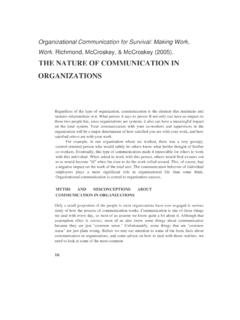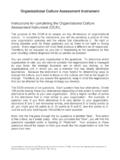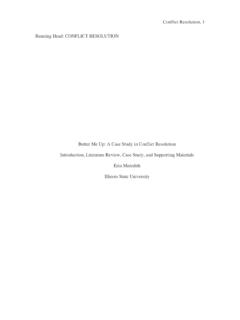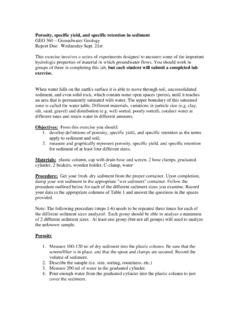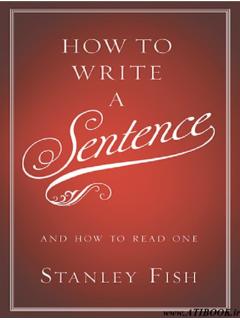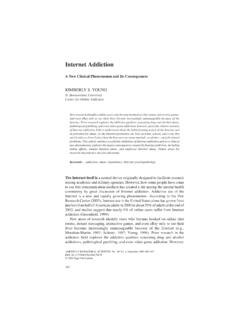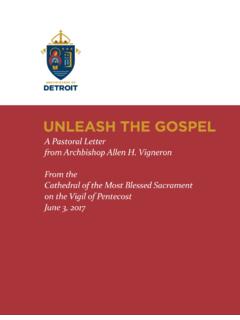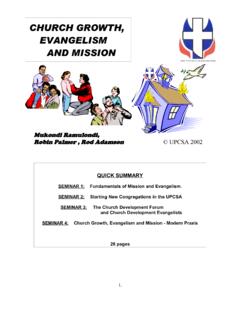Transcription of HISTORY OF PHILOSOPHY I: ANCIENT PHILOSOPHY
1 1 HISTORY OF PHILOSOPHY I: ANCIENT PHILOSOPHY Shellbourne Conference Center, July MMX Professor John Gueguen This course explores the thinkers and doctrines of classical Greek and Roman PHILOSOPHY from its emergence in the VIII century to its early contacts with Christianity. To understand why and how PHILOSOPHY came into existence in a cultural world dominated by poetic mythology and the codified legal norms, it will be necessary to take into account the geographical, literary, social, political, religious, and scientific contexts of the ANCIENT world. Eventually serious inquiry into human and divine realities formed the self-consciously distinct enterprise known as philosophia, or love of wisdom. ANCIENT Greek PHILOSOPHY is traditionally divided into pre-Socratic and post-Socratic periods, thus indicating the centrality of an enigmatic, quasi-mystical figure who provided the catalytic presence for a mature burst of philosophical energy in Plato and Aristotle.
2 The traditions of inquiry they began were to continue orienting PHILOSOPHY for two and a half millennia. Consequently, the course gives them primary attention, following a brief look at their predecessors and concluding with another brief look at the other ANCIENT schools inspired by Socrates in Greece and the Hellenistic schools of Rome. Since later philosophers stand on the shoulders of their predecessors, it is necessary to take note of the specific contributions the ANCIENT thinkers made to later periods that made greater contributions to the development of PHILOSOPHY and theology (especially in influencing the Patristic and Medieval foundations of Christian culture). Then, too, the Greeks and Romans played an important role in preparing the early Christians for an evangelizing mission that required the harmonizing of faith and reason ( ; fides et ratio).
3 A Journey in Search of Truth: A Prologue from John Paul II (a paraphrase of Fides et Ratio, 24-27) 24. PHILOSOPHY , along with literature and all the arts of creative intelligence, has recognized and articulated the universal human desire and urgent quest for God that begins with reason s capacity to move beyond contingency toward the infinite. The Church has always treasured this intimate nostalgia for the unknown God whom St. Paul proclaimed in Athens (Acts 17:22-27; see also the Church s prayer for non-believers in the Liturgy of Good Friday). 25. The proper object of this universal desire is knowledge of real truth, not mere opinions about things: both theoretical truth about the objective reality of things, and practical truth that looks to the good to be performed as the path to happiness and perfection (see Veritatis Splendor).
4 Human maturity is attained when a person is 2 able to distinguish the true from the false, not by turning inward, but by opening to the transcendent. 26. Doubts occasioned by the experience of suffering and of apparently inexplicable facts, together with the absolute certainty of death as something inevitable, give rise to the most basic and unavoidable of all questions: What is the meaning and destiny of life? The death of Socrates, for example, gave to PHILOSOPHY one of its most decisive orientations by posing the dramatic question of human immortality: Is there an afterlife or not? 27. Ever since then, philosophers have sought to discover and articulate one ultimate answer, a universal and final explanation, a certitude beyond all doubt that can serve as a ground of all partial truths, a supreme value that refers to nothing beyond itself and puts an end to further questioning.
5 This search is encountered in personal philosophies of life, as well as in the various systems and schools of thought. B. The Different Faces of Human Truth 28. Man defined as "the one who seeks truth" can never ground his life on doubt, uncertainty, or deception; in spite of the natural limitations of reason, the inconstancy of the heart, and a tendency to flee from it out of fear of its demands, truth always influences human life, even if it is often obscured, distorted, and evaded. 29. Everyday life confirms the fact that men can arrive at the truth. The search for it is deeply rooted in human nature and presumes an initial confidence in the possibility of completing it: The intuition that an answer awaits us is what leads to asking the first question, both in the persistent quest for scientific explanations of phenomena and with respect to the fundamental or ultimate questions to which many men have attained substantially the same answers.
6 30. Truth is accessible through evidence and experimentation (both in everyday life and in scientific research), through exercise of the speculative powers of the intellect (in PHILOSOPHY ), and through religious traditions. Together, these modes of knowing enable everyone to develop his own comprehensive view of life as a guide to interpreting its meaning and regulating behavior.. 33. In sum, the human search for truth can end only in reaching the Absolute, because it is ultimately the search for a Person to whom we can entrust ourselves in sincere friendship (n. 28: This theme, long developed by the Pope, is succinctly expressed in the General Audience of 19 Oct. 1983). Moving beyond simple belief, Christian Faith offers the possibility of reaching the goal because it immerses us in the order of Grace, wherein we can share in the Mystery of Christ and through it a true and coherent knowledge of the Triune God.
7 All of this is impeded by the contemporary climate of suspicion and distrust, which ignores the ANCIENT wisdom about friendship as the best context for philosophical inquiry.. 35. These broad considerations have prepared us to explore more directly the relationship between the two orders of knowledge, revealed truth and PHILOSOPHY --first by examining the links between them in the course of HISTORY . Course Outline 3 1 Introduction to the HISTORY of PHILOSOPHY . Its relevance as a philosophical discipline; its relationship to other philosophical disciplines that study human culture, science, morality, religion; its division into specific historical periods; its treatment of specific thinkers, schools, systems of thought; its critical component, with reference to the truth of knowledge accessible to human reason.
8 2 Introduction to ANCIENT PHILOSOPHY . Its significance in the HISTORY of PHILOSOPHY and world HISTORY ; its division into specific sub-periods; the Greco-Roman or Classical period as historical and cultural concept; conditions favorable for the emergence of PHILOSOPHY in ANCIENT Greece; brief comparison with more ANCIENT oriental schools of thought; overview of course materials and procedure. PART I: PRE-SOCRATIC PHILOSOPHY 3 Four centuries from Hesiod to Socrates. Asia Minor: Ionian speculators (Thales, Anaximander, Anaximenes); Xenophanes and Heraclitus early physical and metaphysical problems; Mediterranean Europe: the Pythagoreans and Empedocles; the Eleatics (Parmenides and Zeno) mathematical and epistemological problems; the first Athenian philosophers: Anaxagoras and the Atomists Leucippus, Democritus early skepticism and pluralism.
9 4 Socrates and his milieu in the Athens recorded by Thucydides. The turn from speculation about the macrocosm of physical nature to the microcosm of human nature: the Sophists and their schools of rhetoric (Protagoras, Gorgias); how Socrates did PHILOSOPHY (dialogical challenges to sophistic relativism and utilitarianism in the search for truth); the opposition aroused by this revolutionary new beginning; introducing four centuries of Socratic influence. PART II: POST-SOCRATIC PHILOSOPHY PLATO AND ARISTOTLE 5 Students of Socrates, Plato chief among them. The trial and death of Socrates and its impact on his followers; the Socrates of the early Platonic dialogues; contrasting portraits of Socrates by Aristophanes and Xenophon; the friends and enemies of Socrates in the HISTORY of PHILOSOPHY .
10 4 6 Emergence of Plato s philosophical vocation and the story of his career. Traveler and seeker after knowledge; an autobiographical account: the Seventh Letter; Plato s school: an Academy for the philosophical formation of statesmen; Plato s teaching method and concept of PHILOSOPHY ( ) as quest for the ( ) of each thing: what is serious and what is playful in Plato s philosophical poetry. the need for a rigorous, life-long formation in the arts and sciences ( ) for the right ordering of the soul ( ) and the city ( ). 7 The sum of Platonic PHILOSOPHY and its subsequent influence. In mathematics, logic and epistemology; in metaphysics, cosmology and psychology; in anthropology, ethics and politics; in rhetoric, aesthetics and theology; the leading disciples of Plato and the subsequent career of the Academy; Plato s influence on early Christianity and throughout the HISTORY of PHILOSOPHY ; Platonism and Neo-Platonism.
